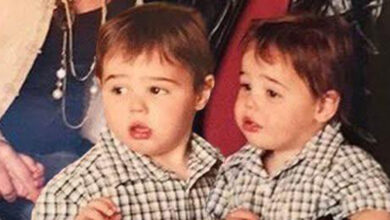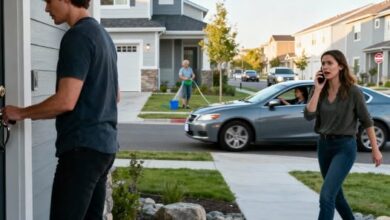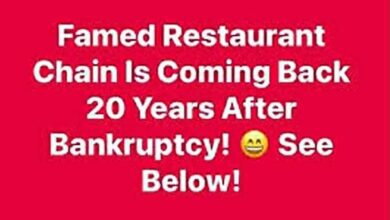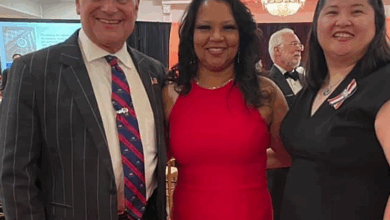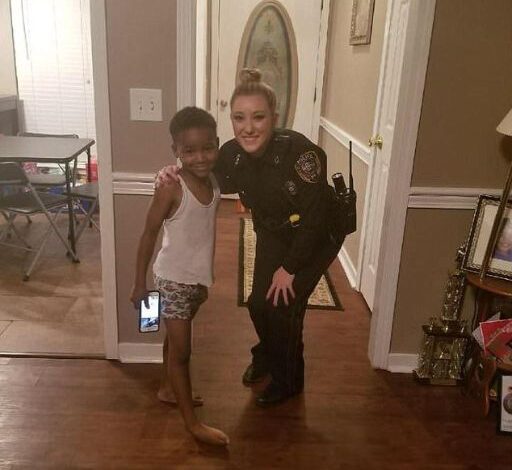
HE CALLED 911 BECAUSE HE WAS HUNGRY, AND THEN SHE SHOWED UP!
When an emergency dispatcher picked up a faint, incomplete 911 call one evening, the assumption was that it might be a mistake or a dropped line. The call traced back to a modest, single-story home on the edge of town. Protocol required a wellness check, so first responders were dispatched.
When they arrived, they weren’t greeted by chaos, fire, or an accident. Instead, eight-year-old Mateo opened the door barefoot, a phone still clutched tightly in his hand. He looked up at the uniformed responder and said something simple, but devastating:
“I’m hungry. We haven’t eaten all day.”
A Home Without Enough
Inside, the scene was both ordinary and heartbreaking. The living room was neat, toys tucked away, and a blanket folded carefully on the couch. But the kitchen told a different story. The refrigerator was nearly empty, save for a half carton of milk and a couple of condiments. A loaf of bread sat on the counter, stale and half gone.
In a back room, Mateo’s younger sister, Sofia, was asleep. Her cheeks were flushed from exhaustion, her stomach empty. Their mother, a single parent working a night shift, had left them in bed while she pulled a double at a nearby warehouse. She hadn’t been able to leave dinner, and her phone sat forgotten at home on the counter.
The responder quickly realized this wasn’t an issue of neglect or carelessness. This was poverty—quiet, grinding, and invisible until an eight-year-old made the brave decision to call for help.
An Unexpected Kindness
While officers documented the situation, paramedic Rosa arrived. She carried with her a small bag: sandwiches she had quickly grabbed from the station. She handed one to Mateo, but before taking a single bite, he tucked it aside for Sofia. Only when Rosa encouraged him did he finally take a bite himself. His eyes closed briefly in relief, and for the first time that night, his body relaxed.
It was a small gesture—bread, meat, and cheese—but in that moment it was everything.
Rosa and the team stayed until their mother could be reached. When she arrived, breathless and terrified, she wrapped her children in her arms. The fear that she would be punished or that her children would be taken from her melted into tears when she learned that social services would not be penalizing her, but instead connecting her family to food banks, school meal programs, and local aid organizations.
The Spark of a Movement
For Rosa, that night was life-changing. She had answered hundreds of calls in her career—car crashes, overdoses, heart attacks—but this was different. Hunger was not a split-second tragedy; it was a slow, relentless crisis that families like Mateo’s endured every day.
Shaken but inspired, she went home and began sketching out an idea. Within weeks, “Midnight Meals” was born—a volunteer-driven initiative to deliver groceries, sandwiches, and pantry staples directly to families identified by local schools, churches, and social workers.
At first, it was just Rosa and a few colleagues from the firehouse. They’d stock boxes with cereal, pasta, peanut butter, and fruit, driving them to doorsteps under the cover of night. But word spread quickly. Donations rolled in from community members who had read about Mateo’s call. Soon, Midnight Meals grew into a network of volunteers making regular deliveries to dozens of families.
A Family Transformed
Months later, Rosa returned to Mateo’s home, not as a paramedic but as a visitor. The difference was striking. The fridge was full, and the children were brighter, healthier, and more energetic. Their mother, relieved of the constant fear of running out of food, spoke with gratitude that was impossible to put into words.
“Sometimes all you need,” she said, “is someone to notice. Someone to care.”
Mateo shyly handed Rosa a thank-you card he had made with crayons. On it, he had drawn his family at the dinner table, plates piled high. Beneath the drawing he had scrawled in large, uneven letters: “Thank you for feeding us.”
Beyond One Call
The story of Mateo and Sofia’s 911 call spread far beyond their town. Local news outlets picked it up, and community members rallied around the idea that no child should have to dial an emergency number just to eat dinner. Midnight Meals, once a side project run out of Rosa’s garage, grew into a community-wide effort with partnerships from grocery stores, restaurants, and civic groups.
More than that, it sparked difficult but necessary conversations about food insecurity in America. For every Mateo who calls, there are thousands of children who remain silent, too scared or too ashamed to ask for help. Rosa’s small act of compassion proved that one moment of care can ripple outward, inspiring change larger than anyone expected.
The Lesson in It All
For the first responders who answered that call, it was a reminder of what service truly means. It isn’t always about sirens, lights, or life-and-death rescues. Sometimes it’s about listening, noticing, and offering something as simple as a sandwich.
Mateo’s courage to pick up the phone, and Rosa’s instinct to respond with compassion instead of judgment, turned one night of hunger into the foundation of a movement. And for one family—and many others since—it changed everything.
Because in the end, being there for people isn’t about recognition. It’s about quiet, human moments where love and care outweigh the noise of the world.

